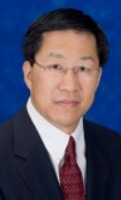
A Wayne State University School of Medicine researcher has been invited to speak at a worldwide conference because of his work in battling tinnitus.
Jinsheng Zhang, Ph.D., an associate professor for the Wayne State University School of Medicine's Department of Otolaryngology, has developed the world's only animal model of an electrical stimulation strategy used to suppress tinnitus. He currently serves as assistant research director of the Department of Otolaryngology and director of the Laboratory of Auditory Prostheses Research. He also holds a joint appointment with the Department of Communication Sciences and Disorders, College of Liberal Arts and Sciences at Wayne State University.
Dr. Zhang was recently asked to address the 2009 conference in Auckland, New Zealand. He will speak on "Cortical Electrical Suppression of Tinnitus" at the Asian-Pacific International Tinnitus Symposium. He has already served as a featured speaker, describing his work with the animal model of auditory cortex electrical stimulation (ACES), at the second Tinnitus Research Initiative International Meeting, held in Monaco in July 2007.
Tinnitus is a phantom sound in the ear or head that occurs in the absence of external stimulation. If chronic, Dr. Zhang explained, it can have debilitating effects on patients. Tinnitus can disrupt concentration, interrupt sleep patterns, alter emotional well-being, and produce anxiety, annoyance, irritability and depression. The disorder affects an estimated 10 percent to 15 percent of the adult population and 33 percent of the elderly. The Department of Veterans Affairs estimates that the financial impact of tinnitus costs the VA more than $500 million annually, creating a significant economic impact on society.
"Although numerous tinnitus management methods have been attempted, there is no reliable treatment for tinnitus," Dr. Zhang said. "None of them have become a routinely accepted treatment to reliably manage tinnitus."
ACES has recently been used to suppress tinnitus in patients with promising results. The process, Dr. Zhang said, has the potential to become an important approach in tinnitus management. However, variability in the efficacy of such suppression has hindered its development into a reliable therapy. The obstacles, he explained, mainly rest in the fact that many issues cannot be comprehensively addressed in patients because of ethical reasons.
To overcome those hurdles, Dr. Zhang's lab has initiated an animal model of ACES, to date the only research group that has this animal model.
Dr. Zhang's lab focuses on developing prostheses to treat tinnitus and improve hearing. His team is interested in suppression of tinnitus and tinnitus-related neural activity through electrical stimulation. Electrical stimulation has been used to suppress the percepts or reduce the loudness of tinnitus in patients when applied to somatosensory structures, cochlea and auditory brain structures. Due to lack of understanding of the mechanisms underlying tinnitus and its suppression, electrical stimulation has not been well established as a reliable therapy. In his animal research, Dr. Zhang's technical approaches combine surgical implantation, electrical stimulation, behavioral testing, electrophysiology and mapping of neural or neurotransmitter pathways. The immediate goal of his animal model of ACES is to identify brain areas and neural pathways for stimulation and optimize the stimulation strategies to effectively suppress tinnitus. His eventual goal is to translate the findings in the animal model to applications in patients through development of tinnitus prosthesis.
In addition, Dr. Zhang is collaborating with WSU engineering colleagues to develop advanced neural implants to be used in central auditory prosthesis, which recovers hearing for patients who cannot benefit from cochlear implantation. Currently, the available prosthesis includes both the auditory brainstem implants (ABI) and auditory midbrain implants (AMI).
While the available central auditory prosthesis systems have demonstrated benefits in hearing recovery, there is a large variability in speech performance. Low speech performance has been attributed to multiple factors, including neural damage from surgery to physiological processing pathway specialized for modulation and speech, channel interactions, low resolution of stimulation or inadequate target for stimulation. Dr. Zhang and Dr. Gregory Auner, professor in WSU's Department of Electrical and Computer Engineering, and director of the university's Smart Sensor and Integrated Microsystems Lab, are developing advanced neural implants to minimize trauma from insertion and reduce interactions among stimulation electrodes/channels. Dr. Zhang also is collaborating with other scientists at Wayne State University to further develop the implantable electrode arrays used for hearing recovery. In addition to development of these implantable devices for hearing recovery, he and his collaborators plan to use them for tinnitus suppression. Clincally, Dr. Zhang works with clinician-scientists at Henry Ford Health System to conduct electrical stimulation to suppress tinnitus in patients.
He has continuously received extramural funding for his research. Recently, he received a three-year, $300,000 grant from the Royal National Institute for Deaf People, a Wayne State University President's Translational Enhancement Program Award of $292,000 and a Tinnitus Research Initiative grant of $30,000 to further his research.